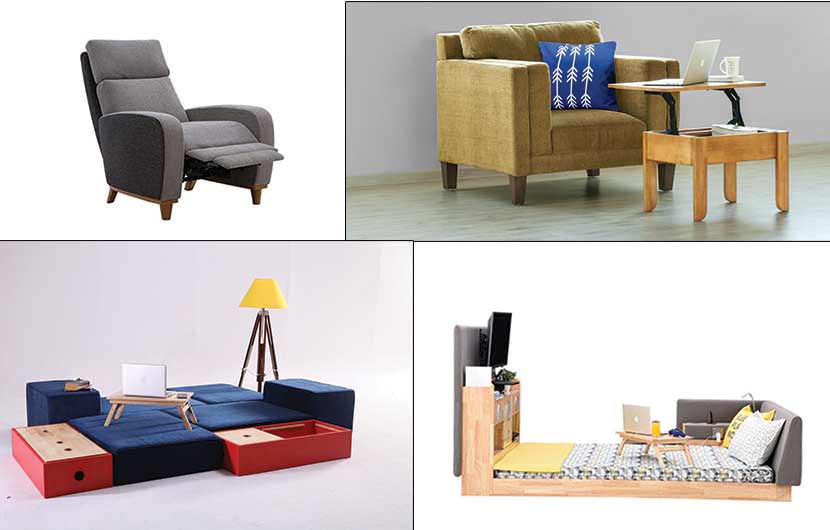For baby boomers and parents of most millennials, owning furniture formed a big part of the pride that was associated with that all-elusive concept of “settling down”. Buying a house, buying a car and then buying beds and large dining tables was amongst the chief life goals for them. But things have changed very drastically for the current crop of consumers and working professionals. Static and settled are words that they literally run away from, and novelty and no-strings-attached are what you’ll find them describing as “life goals”. These preferences then are bound to reflect in their life choices as well, be it in terms of relationships or setting up homes.
The new-age consumer today is either travelling frequently for work or is short on space in his swanky yet compact city apartment. This makes shelling out a fortune on objects like furniture, an unviable option. Renting it, instead, comes as a blessing in disguise and the option that totally complements the fast-paced lifestyle of millennials that is basically fashioned in a way that doesn’t tie them down. But before we explore this concept further, let’s look at how furniture rentals became a way of life for Indian consumers.
Gone are the days when one would assign the local carpenter to make sofa sets, beds or wardrobes and supervise him over weekends while the sound of his saw disturbed the afternoon siestas or study sessions of the entire neighbourhood. With the advent of e-commerce, the tech-savvy and financially wise modern consumer quickly embraced the online mode of buying stylish furniture from dependable brands. After all, who would want a bulky traditional bed when the internet is flooded with sleek trundle beds and minimalist futons that come with an affordable price tag? But eventually, the customer buying from snazzy online stores started facing difficulties in selling their used furniture when they had to move cities for that exciting new project. They realized that although they had paid quite a price for that TV Unit that could only be found in American home décor magazines, they had to now sell it at a market price that was anything but fair. This is when the concept of furniture rentals via the online route made its grand entry in the minds and lives of Indian consumers. It was the perfect marriage of the convenience and appeal of online shopping with the hassle-free aspect of getting rid of the furniture with a click of a button. One could even swap a piece when one got bored of it; after all, a minimum of three months is all one is committing to on most furniture rental websites.
An essential element of setting up a house, furniture is supposed to be the third most expensive purchase one makes after buying a house and a car. The way a home is furnished reflects the personality and self-worth of a person. However, what is interesting is that one rarely gets to know the value of a piece and it eventually sinks the more one uses it. As the newer generation and millennials are more inclined towards the idea of gaining experiences, furniture might be essential, but not what they aspire to own. This unwillingness to invest in purchasing furniture is not a reflection of their inability to buy but their choice to not buy.
According to a recent survey, the total market consumption for furniture rental in India today stands at over $25 billion because of the new-age furniture rental startups that are making the entire process of re-locating from one place to another so simple and smooth. After all, who with a hectic job has time for assembling new furniture or packaging it and shipping it away on shifting? So once the tenure in a particular house is nearing the end in a city, rental companies simply come and collect the furniture, leaving the customers with only a few bags of clothes and other easy movables to deal with.
Millennials prefer a high quality of life in all aspects, whether it is about taking rides through Uber or Ola instead of autos or renting electronic gadgets, luxury fashion, homestays, jewellery, gaming and entertainment gadgets. Naturally, then, they don’t compromise when it comes to furniture. Although globally, IKEA is successfully providing access to quality furniture, for India, the full stack rental model is finding many takers over the idea of ownership. Online furniture rental companies like Furlenco, Rentomojo etc. are already changing the perception towards owning furniture in India today. The thought of sitting in the luxury of your home and swiping through a vast catalogue of highly fashionable and functional furniture and getting it delivered to one’s doorstep is catching up rapidly.
This asset-light business model of renting furniture online is also fascinating many startups, as well as venture capitalists as each and every piece of furniture can get rented several times, for multiple users. This can eventually help in recovering the original cost of goods in a short span of time. But like any other industry, the online furniture rental model too comes with its set of challenges. Getting each piece refurbished before renting it to the next customer for a quality experience can be tricky for some startups. Moreover, there are many such stigmas prevailing around renting furniture due to the unorganized aspect of this industry.
However, given the fact that millennials are constantly on the move, value experiences over anything else and are tech savvy, the hope remains that a considerable number of early customers will influence the behaviour of the masses towards a revolutionized way of living. Having said that, the day isn’t far when from being a ‘rare, cool option,’ renting furniture will become a real, attractive possibility for every smart Indian.



















Pingback: Noida-based student housing startup Placio raises $2 million in funding; looks to expand existing capacity